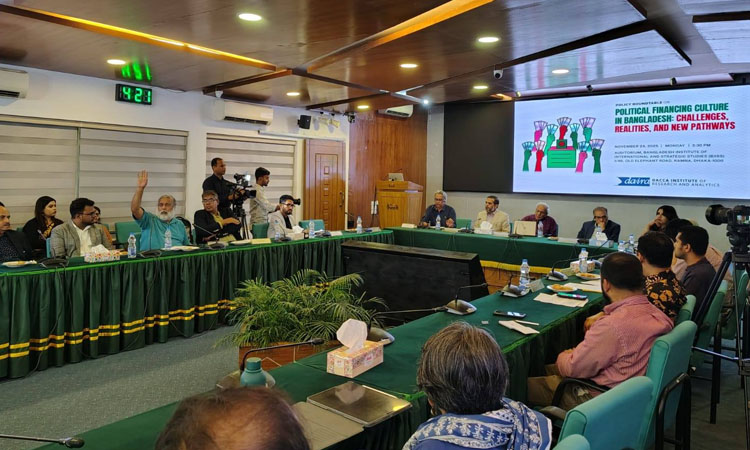News Flash

DHAKA, Nov 24, 2025 (BSS) – Experts at policy dialogue today laid emphasis on systemic reform in political financing to enhance transparency and accountability.
They mentioned that regular party finance is the crucial focus, as it is the more transparent and most foundational element.
It is this regular flow of money that sustains political networks and mobilisation structures, thereby shaping everyday political behavior more than election-time spending, they noted.
They made the remarks at the event on “Political Financing Culture in Bangladesh and Business Protection: Realities and Pathways to Solutions” at the Bangladesh Institute of International and Strategic Studies (BIISS) in the city.
Dacca Institute of Research and Analytics (daira) organised the roundtable.
Shama Obaed, Organizing Secretary, BNP; Ahsanul Mahboob Zubair, Assistant Secretary General of Bangladesh Jamaat-e-Islami; A.K.M Fahim Mashroor – CEO & Founder, bdjobs.com; Dr. Badiul Alam Majumdar, Head, Election Reform Commission; Dr. Iftekharuzzaman, Executive Director, TIB; Jesmin Tuli, Former Deputy Secretary, Election Commission; Dr. Kazi Maruful Islam, Professor, University of Dhaka; Khaled Saifullah, Joint Convener, National Citizen Party; Kazi Mohammad Mahbobor Rahman, Professor, University of Dhaka; Dr. Sazzad Siddiqui, Associate Professor, University of Dhaka; Shams Mahmud, Managing Director, Shasha Denims Ltd; Syed Hasibuddin Hossain, Bangladesh Rashtro Shonskar Andolon and Sibgatullah Sibga, Bangladesh Islami Chhatra Shibir, among others, spoke on the occasion
Dr. Asif M Shahan, Professor, University of Dhaka, moderated the event while Ragib Anjum, Research Associate of daira, delivered a presentation.
To address the entrenched corruption and political culture, Dr. Badiul Alam Majumdar proposed several fundamental changes including political party reform, Right to Information (RTI) inclusion, accountability and transparency and cleaning the electoral arena.
“The political and electoral arenas must be cleansed, and miscreants must be kept away. Ordinary citizens are acutely aware of the corrupt electoral and political culture,” he added.
Dr. Iftekharuzzaman mentioned that effective reform requires a holistic dismantling of the underlying system of power rather than superficial changes to election laws.
He focused heavily on the lack of transparency in political financing, systemic resistance to accountability, and the dominance of a powerful three-way syndicate over the state structure.
He identified a triangular syndicate-comprising Politics, Bureaucracy, and Business—as holding a destructive grip on the political culture of Bangladesh.
This syndicate has successfully captured the state structure, operating under a shared motto: to seize power, commit corruption, protect corruption, and ensure judicial immunity, he added.
He concluded by stressing that while hope remains and opportunities still exist, the nation must urgently address the destructive nexus of Politics, Bureaucracy, and Business for any meaningful progress to occur.
Shama Obaed argued that issues surrounding political financing and accountability are deep-seated social and economic problems, not merely issues confined to specific political entities like the BNP, NCP, or Jamaat.
She detailed the existing fundraising mechanisms within the BNP.
“The system requires each member to contribute a set amount to the party fund monthly. Additionally, new members provide Taka 20 for their membership. Historically, funds have also come from people who love the party and its ideology, often donating to popular political figures for expenses,” she added.
Regarding political funding, she raised the significant challenge of managing donations, questioning the transparency of whether the money contributed is "black money" or "white money.
She concluded that achieving success requires bringing accountability to all actors—politicians, businessmen, and bureaucrats—and addressing issues like unemployment and the need for decentralized authority.
Ahsanul Mahboob Zubair outlined the organization's rigorous financial model, emphasizing comprehensive transparency, accountability, and reliance on grassroots contributions during a recent presentation.
He stated that the organization’s foundational principle rests on two strict rules: "No income without a receipt" and "No expenditure without a voucher".
He explained that any expense incurred must be supported by a detailed voucher, not just a simple claim of spending.
Khaled Saifullah argued that the current problems plaguing political financing in Bangladesh stem from a structural failure rather than merely a moral one.
He emphasized that simply replacing individuals would not solve the issue if the underlying structure remains unchanged.
In his presentation, Ragib Anjum mentioned that political parties in Bangladesh operate through hybrid financing structures that do not neatly fit the four classical international models established after World War II—such as the Clientalist Mass Party, Externally Financed Elite, Self-Financing Elite Party, or the Cartel Party Model.
“When assessed against a matrix combining Rule of Law and Transparency, Bangladesh falls into the Unregulated Matrix, characterized by both low transparency and significant deficiencies in the implementation and formation of the Rule of Law. This environment shapes the local party financing dynamics,” he added.
He said business groups pay these local leaders for various forms of assistance, including approvals, security, protection from harassment, conflict resolution, market protection, or policy passing.
The central party often remains unclear about the exact amount of funding secured at this level, he added.
He noted that the core dilemma raised by the research is whether the central party should be strengthened to oversee all funds (risking the loss of local incentive) or if full authority should be given locally (sacrificing transparency and accountability).
He suggested that sudden changes to the RPO are unlikely to resolve the issues, as monitoring central party funds alone will not capture the true financial reality.
“Instead, a gradual reform is required, focusing on implementing conditional public financing and increasing transparency; making RPO expenditure limits more realistic and using digitalization tools, such as digital finance inclusion, to introduce oversight and monitor grassroots funding without completely removing local incentives,” he added.
He concluded by emphasizing the need to find a way to reconcile the formal RPO rules with the grassroots reality and manage the semi-autonomous financial structures that have arisen at the local level.